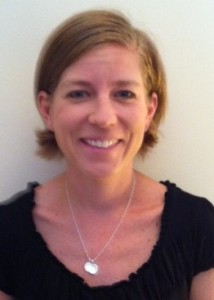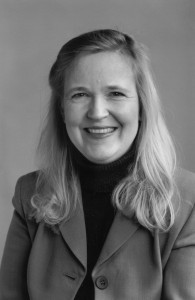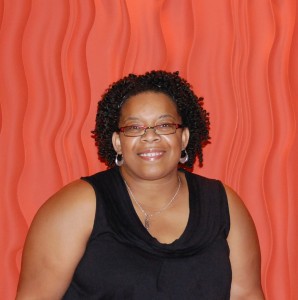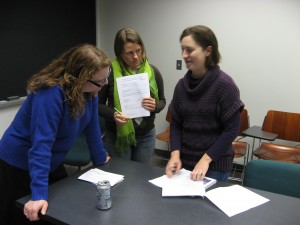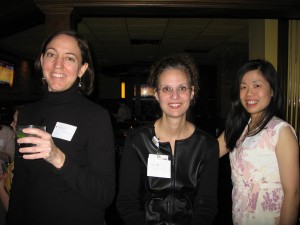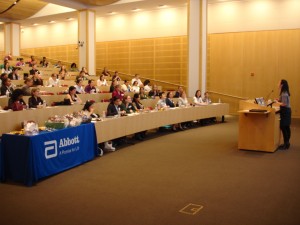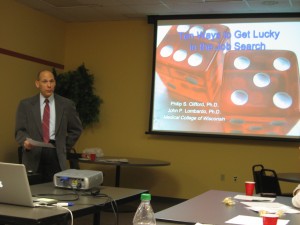By Beth Sefton
I first met Dr. Julie Kim when I was a summer rotation student in my first year of graduate school. During my rotation, I found that enjoyed working in the lab and appreciated Julie’s mentoring style. I opted to join the lab and have been a graduate student in the Kim lab for the past three years. . From the time that I rotated, Julie has never made me feel as if I am “just a graduate student”. She treats me as an equal and respects my opinions. As I am exploring multiple career paths, I feel that Julie will be very respectful of whatever career choices I will make, which is not always the case in academia.. Julie is extremely supportive of my participation in extra-curricular activities and taking on leadership positions that will help me prepare for my life after graduate school. I believe Julie’s own career path and family life give her a realistic approach to life inside and outside of science. She is very supportive of women scientists in her lab and encourages young women to explore science careers.
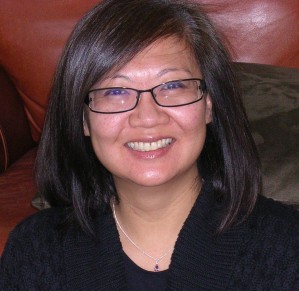 Julie received a Microbiology degree from the University of Toronto in 1990. She then went on to receive a Ph.D in Cellular and Molecular Biology from Laval University where she studied with Dr. Patricia Quinn and Dr. Michel Fortier. Her PhD research introduced to her to reproductive biology, but she implemented her microbiology background to study how infectious agents affect the bovine endometrium. After graduate school, Julie moved to the University of Illinois at Chicago (UIC) to train with Dr.Asgi Fazleabas from 1995-1998. While in Dr. Fazleabas’s lab Julie studied the how the primate endometrium prepares for embryo implantation, a process known as decidualization. In 1998, Julie joined the Department of Obstetrics and Gynecology at UIC as a Research Assistant Professor and continued to research decidualization of the endometrium but with a focus on the progesterone receptor. Currently, Julie is an Assistant Professor at Northwestern University in the Obstetrics and Gynecology Department. Her lab researches the role of the progesterone receptor and AKT pathway in female reproductive tract diseases, such as uterine fibroids, endometrial cancer, and endometriosis.
Julie received a Microbiology degree from the University of Toronto in 1990. She then went on to receive a Ph.D in Cellular and Molecular Biology from Laval University where she studied with Dr. Patricia Quinn and Dr. Michel Fortier. Her PhD research introduced to her to reproductive biology, but she implemented her microbiology background to study how infectious agents affect the bovine endometrium. After graduate school, Julie moved to the University of Illinois at Chicago (UIC) to train with Dr.Asgi Fazleabas from 1995-1998. While in Dr. Fazleabas’s lab Julie studied the how the primate endometrium prepares for embryo implantation, a process known as decidualization. In 1998, Julie joined the Department of Obstetrics and Gynecology at UIC as a Research Assistant Professor and continued to research decidualization of the endometrium but with a focus on the progesterone receptor. Currently, Julie is an Assistant Professor at Northwestern University in the Obstetrics and Gynecology Department. Her lab researches the role of the progesterone receptor and AKT pathway in female reproductive tract diseases, such as uterine fibroids, endometrial cancer, and endometriosis.
Have you always liked science even as a small child?
As a child and growing up, I enjoyed doing well in school and learning. Science was interesting to me and came easy to me.
What sparked your decision to pursue science as a career?
Upon completion of my undergraduate degree, I was unsure of what I wanted to do. I worked in a research lab at Laval University in Quebec City for the summer, under the direction of Dr. Patricia Quinn who was a Professor at the University of Toronto and was doing a sabbatical in Quebec City for a year with Dr. Michel Fortier. I enjoyed working at the bench, discussing science with Dr. Quinn and Dr. Fortier and designing experiments. I fell in love with Quebec and the people. Naturally, I thought it would be a great opportunity for me to not only go to grad school but to learn French at the same time. Neither was easy but I got through it. I defended my thesis in French and got my PhD degree in Cellular and Molecular Biology.
Did you always want to work in academia? Why or why not?
After obtaining my PhD, I did a postdoc at UIC. I was open to exploring different options for my career so I didn’t have a preference to work in academia. I knew that I enjoyed research and the intellectual workout it gave me on a daily basis. However, I knew that there were lots of additional opportunities. To explore, I taught some classes at UIC, shadowed an embryologist in an IVF lab, talked to scientists in industry, considered medical school, as well as continuing in academia. I went to many scientific meetings and talked to people regarding a future in research. I was overwhelmed with all the different paths that I could take. I decided to try out academia and told myself, if I didn’t like it, I’d do something else. I’ve been at Northwestern University for over 7 years now and I think it was the best decision that I made. I love what I do. I love being intellectually challenged on a daily basis and every day holds something different. I can’t see myself doing anything else.
What has been your greatest challenge as a woman in academic science?
If I were to pinpoint a particular challenge in my life as a woman in science, it’s hands down, work/family balance. This can be a challenge that is faced by both men and women that have families, and not just for women. I am married with 2 children, ages 11 and almost 7. My husband is very dedicated to his career in the corporate world and successful. At the same time he’s extremely supportive of my career and is my biggest fan. My children were in daycare by the time they were 6 months old until they were ready for first grade at the local public school. They also attend before and after school programs. We never had a nanny and our extended family was far away (Canada to be exact!). So, the biggest challenge was to be able to juggle work and family life and do well in both.
How have you dealt with that challenge?
I can’t say that I no longer struggle to balance work and family. However, I can confidently say that I have come to a point where the juggling family and work has become a way of life for me that I find extremely gratifying. I was able to come to this point after some soul searching and implementing appropriate support systems. While my career and my family are very important to me, my family has taken that number one slot and my career comes a close second. When faced with a tough decision where I have to choose between work and family, I weigh the pros and cons and lean towards the decision that will be best for my family. Luckily, this doesn’t happen very often and this approach has not kept me from succeeding in my career. Another issue that I had to come to accept is that I don’t have to be the best nor have things perfect all the time. I am more realistic in what I am able to do with the time that I have. But, I began to realize that I could change the way I work to get more accomplished in a shorter time, like multi-tasking and delegating. From a practical standpoint, it was essential that I implement a solid support system to make sure both career and family are taken care of and happy. My husband is extremely supportive and does his best to contribute. My children went to a fabulous child care program at Northwestern University. Currently, my kids attend a great school with wonderful before and after school programs. At Northwestern, I have exceptional colleagues with whom I can truly be myself. My lab consists of dedicated and talented people who generate data and ensure smooth daily functioning. The particulars of everyday life change all the time and I have learned that flexibility is essential. It’s an incredible thing to have come to this point in my life where I feel extremely fulfilled and satisfied as a woman in science. Recently, I asked my children, “would you rather have a mom at home all the time to take care of you and be with you whenever you want?” And their response was, “No way Mom, your job is so cool and fun. And you’re doing something really important!”
What do you think is the greatest obstacle for young women scientists today?
According to studies that have been done at the NIH as well as other big institutions, one of the main reasons why women leave science is because of their personal choices regarding family. I have experienced first hand, women leaving the field because of family. I think these choices are very personal and should be respected to the fullest. We need to realize that all women are different and have specific lifestyle preferences. Some women choose a family over career and some choose a career over family. If there are young women who want both and they are realistic about it, it is absolutely possible to be a scientist and have children. It comes with hard work but the rewards that come with having both are far beyond what can be imagined. Personally, I would like to see more women in basic science research and continue on to be tenured professors and head of departments.
What aspects of your job do enjoy most? What don’t you like?
I enjoy mentoring people. I find great joy in seeing someone learn the scientific process and getting excited about the data they’ve generated. I love exchanging ideas with my trainees and coming up with new ones together. I enjoy making discoveries together.
I do not like the negative criticisms that sometimes come with reviews of papers and grants. I think we should be encouraging each other more.
Any advice for young woman scientists?
Definitely, more women are needed in science. As with anything else, if you are good at it and are passionate about it, there is always a way to work things out to achieve your goals. If those goals include being a successful woman scientist and having a family, YOU CAN DO IT!
Nomination and article submitted by AWIS Chicago Staff Writer Beth Sefton. Ms. Sefton is a PhD candidate at Northwestern University.
Know a scientist you think should be featured in an upcoming “Scientist of the Month” article? Send nominations to communications@awis-chicago.org. Your nominee does not need to be an AWIS member or a woman, but should promote the advancement of women in science, technology, mathematics and engineering.
Want to keep yourself up-to-date on AWIS Chicago activities? Follow AWIS Chicago on Twitter! You can request to be added to our listserve by clicking here, and join the AWIS Chicago group on LinkedIn and Facebook by clicking the icons on the bottom right of this page.

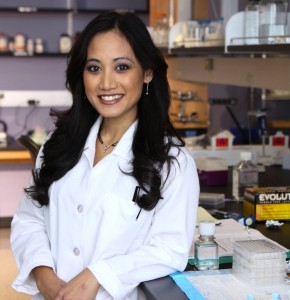 by Eun Ji Chung, Ph.D.
by Eun Ji Chung, Ph.D.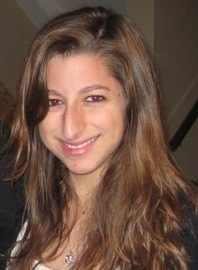 By Marina Pazin
By Marina Pazin